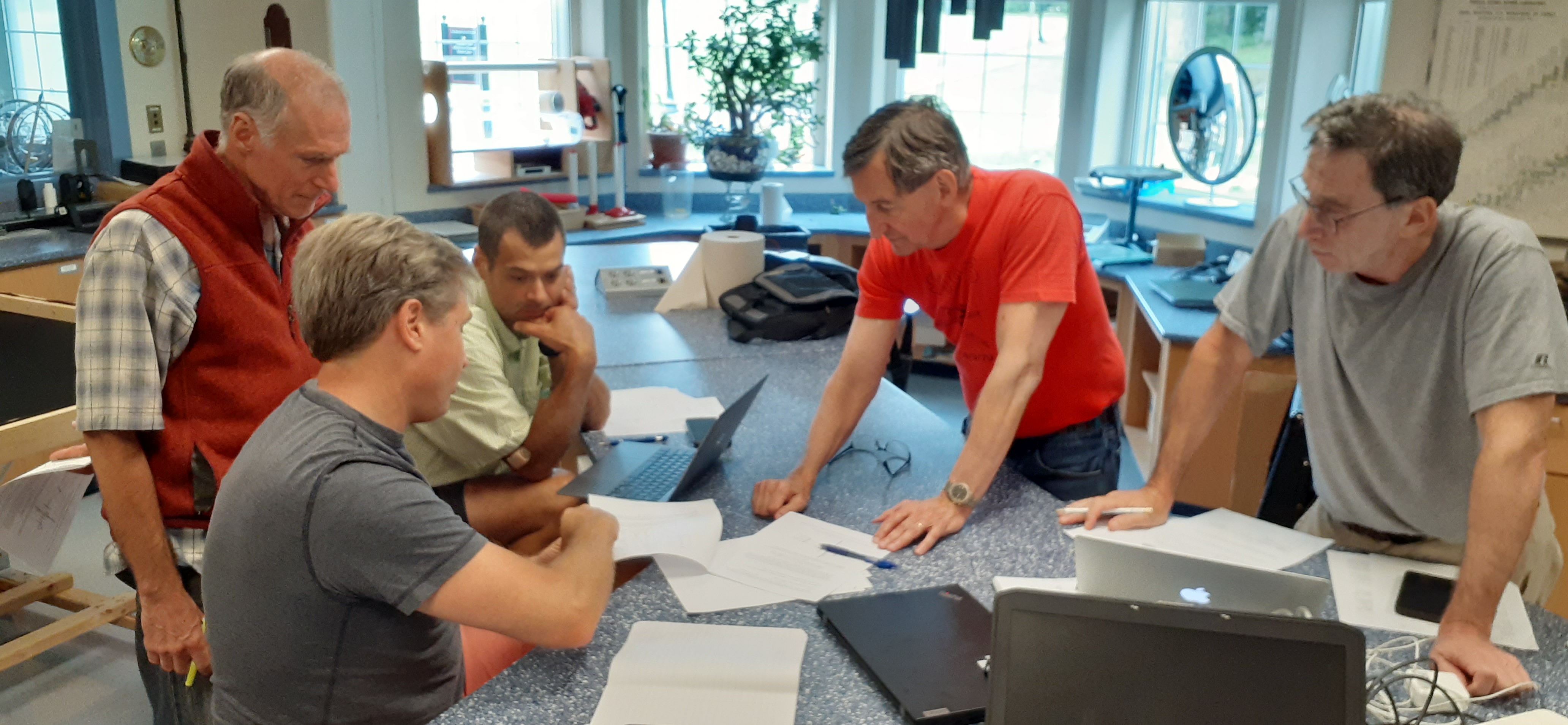Friday Flyer - September 24, 2021

Spotlight on the Boston Center
The Boston Center goes beyond Boston: it covers eastern Massachusetts, all of Rhode Island and more. Under the mentorship of Ulrich Heintz of Brown University and Darien Wood of Northeastern University, Boston is one of our oldest QuarkNet centers. Darien and Ulrich along with lead teacher Rick Dower have been with QuarkNet since the first centers formed in 1999. And they are still going strong!
In the past year of classes online, in person, and various linear combinations thereof, the Boston center kept together with a Zoom meeting in May and an in-person workshop in August. The May meeting featured an in-depth talk by Ulrich ranging from Yang-Mills theory to symmetries and conservation laws all the way to CP violation. The group discussed center business, the most pressing part of which was deciding on a summer workshop. That decision made, Rick prepared a workshop of data-oriented activities on the theme "Photons: X-rays and Gamma Rays". The workshop on August 3 and 4 was well-attended and went very well. FF was there and it was fun! Don't be surprised in the coming months to see one or two of those photon activities find their way to the QuarkNet Data Activities Portfolio.


News from QuarkNet Central
Center leads: If you have not done so already, please complete your 2021 annual report as soon as possible. If your center didn't host a workshop this summer, it's not too late! QuarkNet staff has developed a half-day virtual workshop, Just in Time: World Wide Data Day, that can be easily rolled out, done online or in-person, and facilitated, upon request, by a QuarkNet staff member or fellow. Contact your staff member to learn more and get the ball rolling.
Remember that after a tough late spring and early summer, the Cosmic Ray e-Lab is now tanned, rested, and ready for your data uploads. If you have a cosmic ray detector, please fire it up, take data and upload. Mark Adams and Dave Hoppert are ready to help with answers to questions, technical help, and even repairs (to CRMDs, not the squeaky gate in front of your house).
Keep an eye on these upcoming events and the dates that go with them:
- Tomorrow! The PoLS-T Network presents a live online talk by Al-Karim Gangji of the Queens College Physics Department on "'Changing the Culture for the Love of Learning", Saturday, September 25 at 11-12 am EDT, Get more information and sign up soon!
- QED (QuarkNet Educational Discussions) will begin again on Wednesday October 6. Want to join in or learn more? Sign up for the QED email list.
- Events surrounding Dark Matter Day take place on or around October 31. Watch for updates on the Dark Matter Day page.
- The tenth annual International Cosmic Day will be on November 10 this year. Check out the ICD website for more information, and here is a poster to help promote the event.
- The sixth World Wide Data Day (W2D2) will happen on December 1. Watch for details in future Friday Flyers and on the W2D2 page.
- International Masterclasses 2022 is already a thing. The first IMC2022 circular came out last week and another is coming out soon. IMC2022 videoconferences will run from February 24 to April 9 overall; the Fermilab videocon dates will be announced in the next FF.
And, in case you missed it, CERN announced the Beamline for Schools 2021 winning teams.

Physics Experiment Roundup
You know how you sometimes look around your home for one thing but instead find other stuff you'd been looking for? Accoring to Universe Today, something like that may have happened with the XENON1T experiment. This dark matter search experiment may just have stumbled onto Dark Energy instead. Staying in discovery mode, APS Physics proposes an experimental test of a string theory prediction and Physics Today explains how new exoplanets are found in Kepler data.
Maybe your students want to perform their own particle physics experiment. Science in School might help, with their virtual particle accelerator activity. (H/T to our friends at Netzwerk Teilchenwelt.)

Resources
Is Kirsty Duffy done? Not yet! Kirsty has a new Even Bananas video out, How do we study neutrino oscillation?, which features her fellow Fermilab fellow Anne Norrick as a special guest. You might recognize Anne from her great work moderating Fermilab masterclass videoconferences. We have more on neutrinos from Columbia News, featuring Columbia University physicist and MicroBooNE collaborator Georgia Karagiorgi, who is part of the search for a fourth neutrino flavor.
We all know that the 2020-21 academic year was hard. Yet, we learned some things about teaching. Now there is a summary of "CORE" principles learned in Faculty Focus. It was written for higher education but it seems to apply to all of us. (H/T to QuarkNet mentor Angela McRae at Catholic University.)

Just for Fun
When is collider physics a pedestrian topic? Maybe when two teams of physicists "walked away" - or perhaps ran into - two IgNobel Prizes this year. At least APS Physics seems to say so and that is good enough for FF.
Picture an electron. Or make a picture with electrons. According to Fraction, electrons were the common denominator for the work of photographer Adam Nadal as artist-in-residence at Fermilab in 2018, when he used a linac as the flashbulb for his images.
Finally, our pals at our sister program Netzwerk Teilchenwelt in Germany have made a cool little video about their work. It is in German but you do not really need to know any German to follow!
QuarkNet Staff:
Mark Adams: adams@fnal.gov
Ken Cecire: kcecire@nd.edu
Spencer Pasero: spasero@fnal.gov
Shane Wood: swood5@nd.edu
